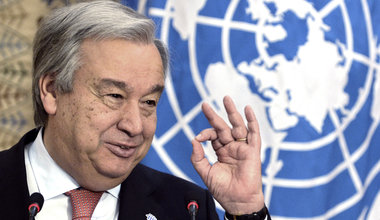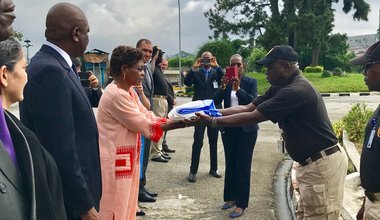Daily Brief on Côte d’Ivoire for Thursday, 12 February 2009
Highlights
- SRSG calls on IEC to set an electoral timetable as soon as possible
- Strikers close down identification centres in Daloa area
SRSG's activities
The Special Representative of the UN Secretary-General for Côte d'Ivoire, Y.J. Choi, today called on the Independent Electoral Commission (IEC) to establish an electoral timetable as soon as possible in order to maintain the present momentum in the Ivorian peace process. Speaking during UNOCI's weekly press conference, Mr. Choi said that it was crucial to do so in order to allow for rational planning and thus avoid delays in the process. He also said that available data allowed for a rational timetable to be established at this time. Touching on the ongoing identification and voter registration operation, the Special Representative said that so far 4.6 million Ivorians had been enrolled and identified and if the present trend continued, the operation should end by Spring 2009.
Identification
All the co-ordination centres for the identification and voter registration operation were closed in Daloa (centre west) today due to a strike by regional electoral commissioners and agents from the National Commission for Supervision of Identification (CNSI). Some of the strikers were demanded the payment of their allowances while others demanded their salaries. In order to make their strike effective, they prevented other staff involved in the operation from accessing the regional offices of the Independent Electoral Commission.
Meanwhile, the IEC is set to deploy mobile identification teams in the Vallée du Bandama region in order to reach parts that have not been adequately covered. An additional 28 new centres are also due to open in Bouaké sous-préfecture.
Security
UNOCI peacekeepers yesterday reported hearing the sound of gunshots coming from the direction of the residence of the Zone Commander of Séguéla. A patrol was sent to the area to get more information on the incident but was unable to do so. Meanwhile, peacekeepers are closely monitoring the situation.
Residents in Santie, some 34 km west of Daloa (centre-west), have complained to a UNOCI patrol about road robberies on the roads leading to the village. According to them the Ivorian Gendarmerie does not patrol the area.
Arms embargo
UNOCI peacekeepers yesterday successfully conducted arms embargo inspections at the 51st and 52nd battalions of the Armed Forces of the Forces Nouvelles (FAFN) in Bobi, near Séguéla (centre-west), at its 66th battalion in Gbapleu (west), at its unit in Korhogo (north), 107th Battalion FAFN at NIELLE and at the Defence and Security Forces of Côte d'Ivoire (FDSCI) camp in Taï (west), at its air base in Abidjan and at its mobile gendarmerie squadron in Bondoukou (east) However, a similar inspection at the FAFN's 62nd battalion in Sémien (west) did not take place because the commander said that he would not allow it in the light of the violent clashes between FAFN dissidents and loyalist soldiers in Man on 1 February 2009.
Human Rights
The Regional Human Rights Office in Bouaké is following up the case of a woman who was physically assaulted by a soldier from the Armed Forces of the Forces Nouvelles' (FAFN) Compagnie Guépard commanded by Chérif Ousmane Haïdara, on 4 February 2009 in her bar in the Air France neighbourhood of Bouaké. The victim was severely beaten about the head with a truncheon by her attacker, who also stole her mobile phone, a music player and 160,000 FCFA (approx $320) when she refused to change the music as demanded by him. The offender was summoned several times to report to a local police station but he has refused to do so.
The Regional Human Rights Offices in Man (west), San Pedro (south west) and Yamoussoukro (centre) in collaboration with the "Coalition pour l'Examen Périodique Universelle de la Côte d'Ivoire" (CEPU-CI) organised human rights training workshops for 76 civil society representatives. The sessions covered topics such as political and civil rights, economic rights, social and cultural rights and the protection of vulnerable persons as well as international humanitarian law and reporting and writing skills. The aim of the training was to provide local human rights works with the skills to write reports on the local human rights situation in their respective areas, which would then be compiled into one document and sent to the Human Rights Council in December 2009 for review.
 ONU
ONU Nations Unies Maintien de la paix
Nations Unies Maintien de la paix



